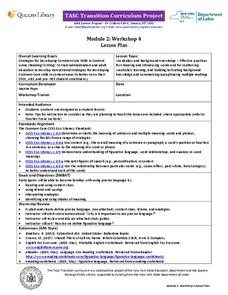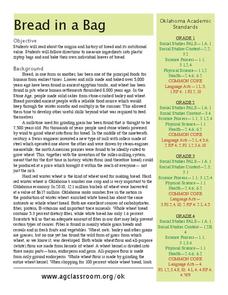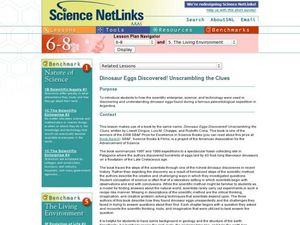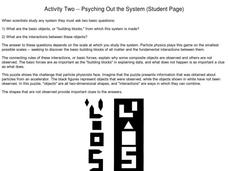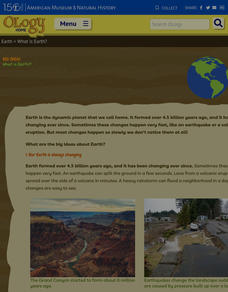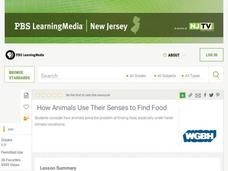Curated OER
Fly Detective
Learners use classification skills and clues to determine which flying insect is the one they need to circle. They read four clues and examine each of the five insects depicted. They then deduce which one is the mystery insect. Answers...
K12 Reader
Adapting to Survive
Life science and language arts come together in a passage about animal adaptation. After kids learn about how organisms adapt to conditions in their environments, they complete five reading comprehension questions based on context clues...
Intel
Forensics: Get a Clue
Although the methods are all scientific, forensic science was started by police officers rather than scientists, who relied on observation and common sense. Young detectives use many tools to solve crimes around the school in a...
New York State Education Department
TASC Transition Curriculum: Workshop 4
Why is it important to use precise language? Participants explore this question in the fourth activity in a series of 15 on effective instruction. Perfect for all content areas, the activity promotes appropriate language choice through...
Curated OER
EEEK! A Spider!
Youngsters complete a unit of lessons based on the story "Little Miss Muffet." They predict what will happen in the story, and use context clues to look for meaning in the words. They research information about spiders using the Internet...
American Chemical Society
Chromatography - Color Clues
Here's an activity that will change how one sees color. Pupils try out an experiment on chromatography where they place a drop of food coloring on a coffee filter, add several drops of water, and watch the colors spread and separate....
Curated OER
Bread in a Bag
Could the history of bread really be interesting? Yes, it could! An informational text gives scholars wheat production background from 8,000 years ago, discussing different types of bread and the current industry in Oklahoma. Learners...
Curated OER
Reading Comprehension 1: Level 11
Here’s a reading comprehension assessment that will capture the interest of your learners. Stink bugs and the danger they pose to farmers is the subject of the passage, while the eight questions ask readers to infer, predict, summarize...
Curated OER
Dinosaur Eggs Discovered! Unscrambling the Clues
Just a heads up: this instructional activity is based on a book, Dinosaur Eggs Discovered! Unscrambling the Clues. If you do not have or do not want to purchase the book, you may still find the other activities and worksheets useful in...
Curated OER
Guided Reading Organizer for Chain Reaction
The class uses Chain Reaction, a magazine, to build a better understanding of Latin and Greek roots found in scientific vocabulary. They use two attached worksheets to help them read a scientific article, using visual clues and their...
EngageNY
Mid-Unit Assessment: Close Reading of Bullfrog at Magnolia Circle: Bullfrog Life Cycle
The sixth lesson plan in this Bullfrog at Magnolia Circle unit assesses your third graders' ability to read and understand informational text. The included assessment asks learners to take notes about the main idea and supporting details...
K12 Reader
Phases of the Moon
Take one giant leap for mankind with a reading passage about the moon. Kids learn about the lunar cycle with context clues and reading comprehension questions, making it a good informational text for your language arts lesson.
CK-12 Foundation
Rocks and Processes of the Rock Cycle: One Rocks Turns to Another...
Geology scholars test their rock identification skills in an interactive that examines the rock cycle from the three main nodes of rocks. Other topics include visual clues to rock identity and the conditions needed to make rocks change...
Curated OER
Activity Two--Psyching Out the System (Student Page) Asking Questions, Using Clues
Students observe two-dimensional shapes and work on the challenge that what is observed is as important as what is not observed.
Students determine constructions, rules and connections.
Full references listed for further reading and...
American Museum of Natural History
What is Earth?
Humans have only inhabited Earth for a short part of its existence. An online resource explains how scientists use clues from rocks and fossils to piece together information about Earth prior to humans. The online instruction includes...
Beyond Benign
Sustainability Bingo
Play a little Bingo and learn a little chemistry. The third installment in a 24-part series gives scholars the opportunity to play a game of Bingo while they review the 12 principles of green chemistry. The principles make up the Bingo...
Ocean Explorer
Looking for Clues
Upper graders become "shipwreck detectives" by studying the debris field from a shipwreck in the Aegean Sea which took place in the 700s. A website is accessed that gives specific information about the debris field, and pairs of...
Curated OER
How Animals Use Their Senses to Find Food
Students plan a scavenger hunt for food and provide classmates with clues. In this animal adaptation lesson, students view videos showing how various animal species find food. They create a scavenger hunt for their classmates that uses...
K12 Reader
Elements & Atoms
Study matter in a new way with a cross-curricular assignment for language arts and math. Learners answer five reading comprehension questions after reading a few paragraphs about the periodic table, properties of elements, and how atoms...
Pingry School
The Periodic Law
Time to put the knowledge to the test! Young scholars take what they know about the periodic table and build their own from scratch. Using clues from 26 different elements, they place elements in a blank periodic table. The clues include...
International Technology Education Association
Telescope as Time Machine
This resource provides an explanation of NASA's GALEX mission and how the space-based telescope can view distant galaxies as they were billions of years ago. The resource also discusses the other aspects of galaxies that GALEX is able to...
Teach Engineering
Energy Intelligence Agency
Protect the world from energy depletion—join the Energy Intelligence Agency. Using a set of cards, pupils distinguish between correct and incorrect information regarding energy use in the United States. They analyze graphs and diagrams...
K12 Reader
What Causes Reflections?
Your kids probably use mirrors every day, but do they know how they work? A reading passage about reflection and reflective objects can address both physical science and reading comprehension. Kids read the paragraphs and use context...
Curated OER
Logic Problems: Using a Matrix
In this logic worksheet, students are given 2 matrices to help them solve problems using logic. Students are given clues that they use to complete the matrix in order to find the answer.
Other popular searches
- Free Using Context Clues
- Reading Using Context Clues
- Reading Using Picture Clues
- Vocabulary Using Context Clues
- Using Context Clues in Science
- Using Clues in Reading





